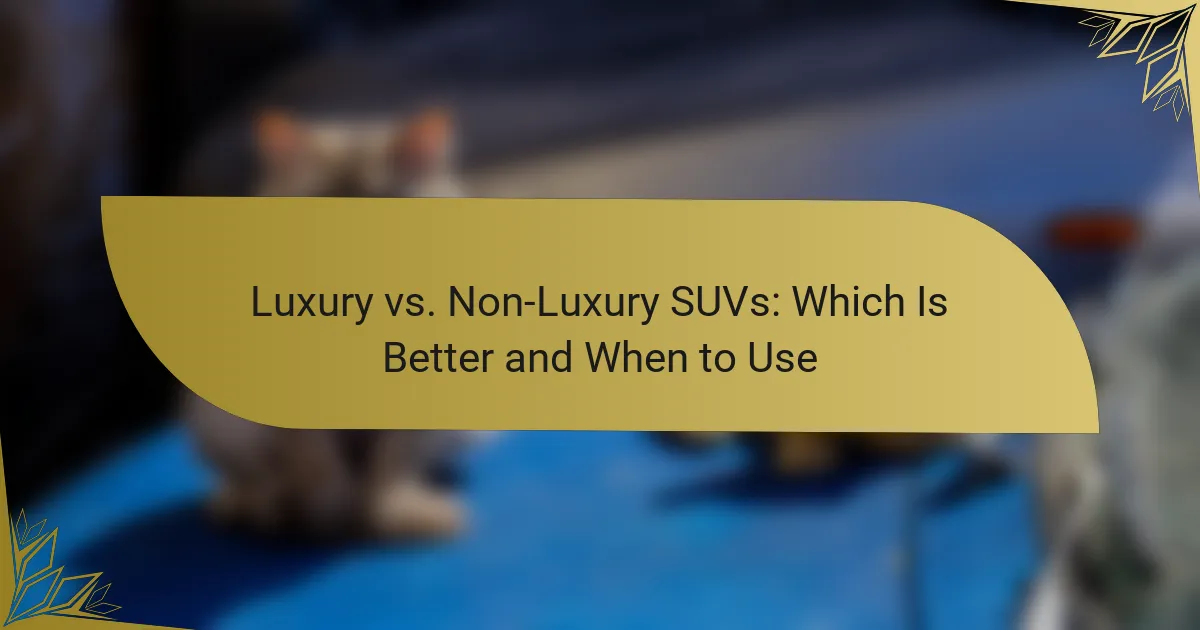When considering the choice between luxury and non-luxury SUVs, it’s essential to evaluate your specific needs and lifestyle. Luxury SUVs excel in comfort, advanced technology, and performance, making them ideal for those who prioritize a premium driving experience. In contrast, non-luxury SUVs offer practicality, affordability, and lower maintenance costs, appealing to families and budget-conscious drivers. Understanding these differences can help you make an informed decision that aligns with your preferences and requirements.

What are the benefits of luxury SUVs?
Luxury SUVs offer a range of benefits that enhance the driving experience, including superior comfort, advanced technology, and better performance. These vehicles cater to those seeking not just transportation, but a lifestyle marked by quality and prestige.
Enhanced comfort and features
Luxury SUVs are designed with high-quality materials and advanced features that prioritize passenger comfort. Expect plush seating, spacious interiors, and premium sound systems, which contribute to a more enjoyable ride.
Many models come equipped with features like heated and ventilated seats, multi-zone climate control, and customizable ambient lighting, making long journeys more pleasant for all passengers.
Superior performance capabilities
Luxury SUVs often boast powerful engines and advanced drivetrain technologies that enhance performance. These vehicles typically offer quicker acceleration, improved handling, and better towing capacities compared to non-luxury models.
For instance, many luxury SUVs feature all-wheel drive systems that provide better traction in various weather conditions, making them suitable for both city driving and off-road adventures.
Prestige and brand recognition
Owning a luxury SUV often comes with a sense of prestige and status. Brands like BMW, Mercedes-Benz, and Audi are recognized worldwide for their quality and performance, which can enhance the owner’s image.
This brand recognition can also influence social perceptions, as luxury vehicles are often associated with success and affluence, making them appealing to many buyers.
Advanced safety technologies
Luxury SUVs frequently include cutting-edge safety features that enhance driver and passenger protection. Technologies such as adaptive cruise control, lane-keeping assist, and automatic emergency braking are commonly standard in these vehicles.
Many luxury models also offer advanced driver assistance systems that utilize sensors and cameras to provide real-time feedback, helping to prevent accidents and improve overall safety on the road.
Resale value retention
Luxury SUVs generally retain their value better than non-luxury counterparts, making them a more sound investment over time. High demand for these vehicles in the used car market contributes to their strong resale values.
Factors such as brand reputation, quality, and features play a significant role in maintaining resale value, with some luxury SUVs retaining a significant percentage of their original price even after several years of use.

What are the benefits of non-luxury SUVs?
Non-luxury SUVs offer a range of practical benefits, making them an attractive choice for many drivers. They typically provide affordability, lower maintenance costs, and practicality for families, all while delivering decent performance and comfort.
Affordability and cost-effectiveness
Non-luxury SUVs are generally more affordable than their luxury counterparts, with starting prices often in the low to mid tens of thousands of dollars. This lower price point makes them accessible to a wider range of consumers, allowing for budget-friendly financing options.
Additionally, non-luxury SUVs often come with more straightforward trim levels and fewer costly add-ons, which can help keep overall expenses in check. This cost-effectiveness is particularly beneficial for first-time buyers or those looking to maximize value.
Lower maintenance costs
Maintenance costs for non-luxury SUVs are typically lower than those for luxury models. Parts and service for these vehicles are often more affordable and widely available, reducing the overall cost of ownership.
Furthermore, many non-luxury SUVs are designed with durability in mind, which can lead to fewer repairs and longer intervals between service appointments. This reliability can save owners both time and money over the life of the vehicle.
Practicality for families
Non-luxury SUVs are often designed with family needs in mind, offering spacious interiors and ample cargo capacity. Many models feature versatile seating arrangements, allowing for easy adjustments to accommodate passengers and gear.
Safety features are also a priority, with many non-luxury SUVs equipped with advanced driver-assistance systems as standard. This focus on practicality makes them an excellent choice for families seeking a reliable and functional vehicle.
Fuel efficiency options
Many non-luxury SUVs provide a range of fuel-efficient options, including hybrid and smaller engine variants. These models can achieve competitive fuel economy, making them appealing for budget-conscious drivers and environmentally aware consumers.
For example, some non-luxury SUVs can deliver fuel efficiency ratings in the mid to high 20s miles per gallon (MPG) in combined driving conditions. This efficiency can significantly reduce fuel expenses over time, especially for those who frequently drive long distances.
Wider availability of models
The market for non-luxury SUVs is vast, with numerous manufacturers offering a diverse selection of models. This wide availability means buyers can choose from various styles, sizes, and features to find the perfect fit for their needs.
Additionally, the abundance of options often leads to competitive pricing and promotional deals, making it easier for consumers to find a vehicle that meets their budget and preferences. This variety ensures that buyers can explore multiple choices before making a decision.

When should you choose a luxury SUV?
Choosing a luxury SUV is ideal when comfort, advanced features, and superior performance are priorities. These vehicles often provide enhanced driving experiences, making them suitable for specific needs such as long-distance travel, off-road adventures, business use, or aligning with a luxury lifestyle.
Long-distance travel needs
Luxury SUVs excel in long-distance travel due to their spacious interiors and comfortable seating. They often come equipped with advanced infotainment systems, high-quality sound systems, and features like adaptive cruise control, which enhance the driving experience on extended journeys.
When selecting a luxury SUV for long trips, consider models that offer ample cargo space and fuel efficiency. Many luxury SUVs provide a range of 20-30 miles per gallon, making them a practical choice for road trips.
Frequent off-road adventures
If you frequently venture off the beaten path, a luxury SUV can offer both rugged capability and comfort. Many luxury models come with advanced all-wheel-drive systems, adjustable suspension, and off-road driving modes that enhance performance on challenging terrains.
Look for features such as skid plates, hill descent control, and terrain management systems. These attributes can significantly improve your off-road experience while still providing the luxurious amenities expected from high-end vehicles.
Business and corporate use
Luxury SUVs are often preferred for business and corporate use due to their professional appearance and comfort. They can serve as executive transport, providing a spacious and refined environment for meetings on the go.
When considering a luxury SUV for corporate purposes, evaluate options that offer features like premium leather seating, advanced connectivity, and privacy glass. These elements can enhance the overall impression during client meetings or corporate events.
Luxury lifestyle alignment
Choosing a luxury SUV can reflect and enhance your lifestyle, especially if you value high-end brands and exclusive features. These vehicles often come with bespoke options, allowing for customization that aligns with personal tastes.
Consider how the SUV fits into your lifestyle, such as its brand reputation, design aesthetics, and technology offerings. A luxury SUV can serve not only as a mode of transportation but also as a statement piece that complements your identity and social standing.

When should you choose a non-luxury SUV?
Choosing a non-luxury SUV is ideal when budget constraints are a primary concern or when practical features are prioritized over premium amenities. These vehicles often provide sufficient space, reliability, and functionality for everyday use without the higher costs associated with luxury models.
Budget-conscious decisions
Non-luxury SUVs typically come with lower starting prices, making them more accessible for families or individuals on a budget. For example, while luxury SUVs can range from $40,000 to over $100,000, non-luxury options often start around $25,000, allowing for significant savings.
In addition to the purchase price, consider ongoing costs such as insurance, maintenance, and fuel efficiency. Non-luxury SUVs generally have lower insurance premiums and maintenance costs, which can further enhance their affordability over time.
When evaluating options, create a checklist of essential features you need, such as cargo space, safety ratings, and fuel economy. This will help you focus on practical models that meet your requirements without overspending on luxury features you may not use.



